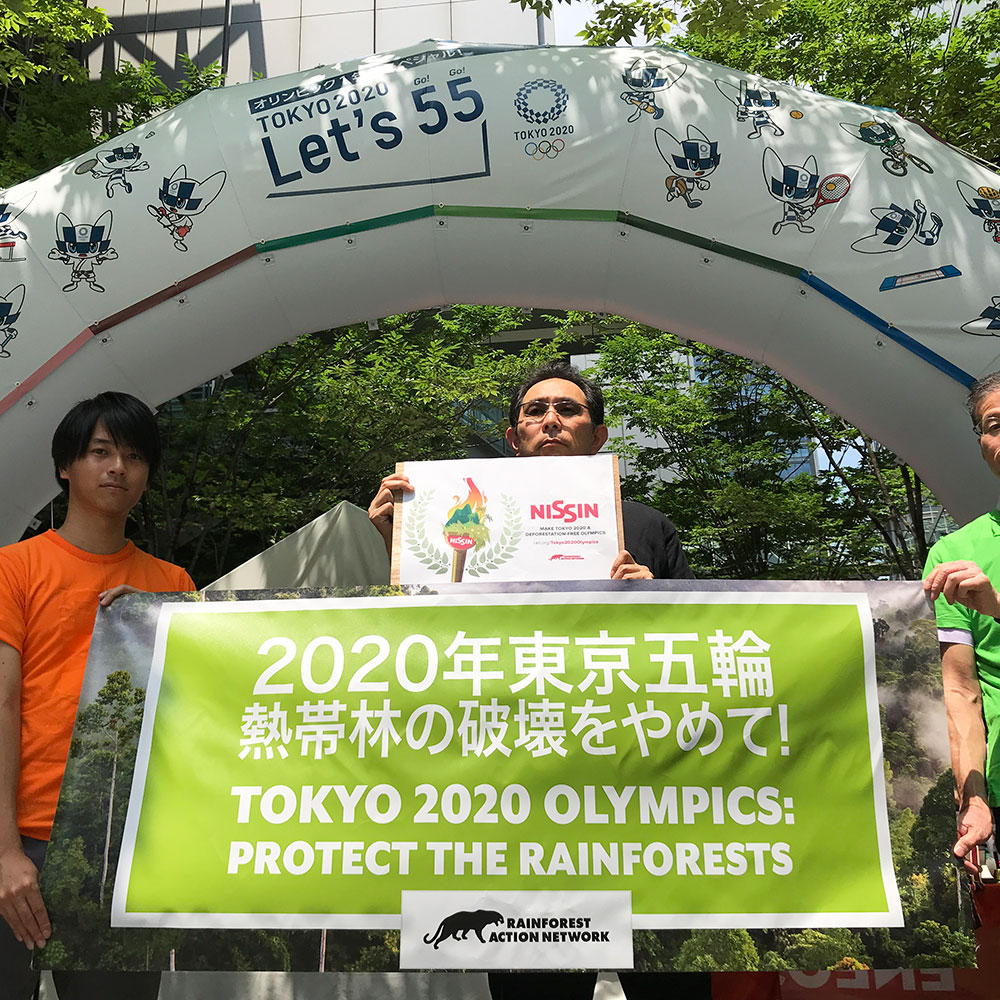The opening ceremony of the 2020 Olympic Games in Tokyo is now less than one year away, so it’s a good time to take stock of how the Tokyo 2020 organizers have lived up to their promise to host a sustainable Olympics.
The short answer is THEY HAVEN’T, and they’re trying to sweep their mistakes under the rug.
Our relentless campaigns got the Tokyo 2020 organizers to disclose how much tropical wood they’ve been using to construct the Olympic venues, and we were shocked to find out that over 170,000 massive sheets of plywood made from tropical rainforests had been used as of the end of November 2018, mostly to construct their brand new Olympic Stadium. In fact, almost every new venue being built for the Tokyo 2020 Olympics — aside from the new archery field — was built with tropical plywood either from Malaysia or Indonesia.
Last fall, investigations with our partners— TuK INDONESIA and WALHI — exposed how one major Olympic wood supplier — Korindo — had a history of cutting down rainforest in some of the most diverse tropical ecosystems in the world and was illegally grabbing community land. We traced Korindo wood from the Olympic construction site in Tokyo all the way to the pristine rainforests of Indonesia that were being clear cut for palm oil. We even caught Korindo sourcing wood from the habitat of critically endangered Orangutans in Borneo. This was unsustainable sourcing at its worst. See our video below.
So we filed two grievances with each of the three Olympic organizers (Tokyo 2020 Olympic Committee, Tokyo Metropolitan Government and the Japan Sport Council), calling on them to set things right. We even delivered our complaints directly to the Japanese Consulate in San Francisco, with our Orangutan friend Strawberry. And with the help of our supporters, we called out Olympic organizers for fueling deforestation, human rights abuses, and habitat loss and demanded that they stand behind their claims of sustainability.
To their credit, there’s been some progress, but not nearly enough to save the rainforests and respect the rights of local communities that are being affected by the Olympics.
In recent months, the Tokyo Olympic organizers revised their timber sourcing policy to explicitly rule out timber from converting forests into plantations like palm oil, and the International Olympic Committee (IOC) released a guide on sustainable sourcing that calls for adopting “sourcing policies that monitor progress on zero deforestation commitments… [and] promote protection of high conservation value forest habitats.” These measures sound good, but in the end it comes down to implementation and enforcement. Unfortunately, as recently as last month, we found controversial tropical plywood from Sarawak, Malaysia still being used for Olympic construction, and Olympic organizers appear to be in complete denial of the failures of their procurement practices.
Equally concerning is the fact that Olympic organizers still aren’t being held to account for the harm they’ve caused. As of this date, three of the six complaints we filed have been rejected, with one in particular on highly questionable grounds. After months of near radio silence, our complaint to the Tokyo Metropolitan Government for the use of Korindo wood got rejected on grounds that it conflicted with information received from their timber supplier AFTER the complaint was filed. This is despite the fact that the complaint was never even formally accepted. This is NOT how grievance mechanisms should work, at least according to what’s outlined in the universally accepted Guiding Principles for Business and Human Rights. Ironically, both the Japanese Government and the Tokyo 2020 Olympic Committee have endorsed this framework, so clearly there’s a disconnect between their words and their actions.
So what have we done? As a first step, we’ve raised the issue with the International Olympic Committee (IOC). Days before the regularly scheduled Coordination Commission Meeting between the IOC and the Tokyo 2020 organizers, we sent a letter demanding a thorough investigation into whether the Tokyo 2020 grievance mechanisms are actually working and consistent with the Guiding Principles. See our letter below.
Meanwhile, we’re paying attention to other Olympic procurement practices that threaten rainforests and human rights: specifically the sourcing of pulp & paper and palm oil. That’s right. Japan is a major consumer of paper products from Indonesia that are made from pulp produced on carbon-intensive tropical peatlands; and more and more Japanese companies are using palm oil for their products. So there’s a very real likelihood of more damage to rainforests at the hands of the Olympics unless we act now.
The Olympic saga continues.
Letter to IOC re Tokyo 2020 Grievance Mechanism_FINAL